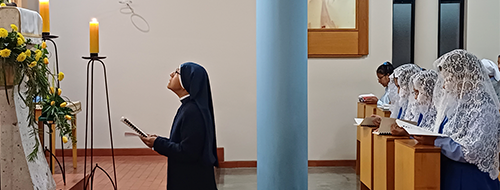
The Missionary Sisters of Jesus, Word and Victim, were visited by Bishop Manuel Fanjul, Doctor of Liturgy, from 1 to 4 October. He gave a series of lectures on the call to holiness according to the apostolic letter Gaudete et exsultate and on liturgical formation according to Pope Francis’ apostolic letter Desiderio Desideravi. Below is the programme he gave at the Cenacolo Convent:
I. THE HOLINESS
MJJV. Convent of the Cenacle of Caravelí. 2-4 October 2023
- Being Saints in the 21st Century. Reading of Gaudete et exsultate.
- The vocation to holiness.
- Keys to reading Gaudete et exsultate.
II. The vocation to holiness
- The exhortation to holiness.
- Opportunities and objectives.
- Synthesis and comments.
- The call to holiness.
- Two subtle enemies of holiness.
- In the light of the Master.
- Signs of holiness in today’s world.
- Struggle, vigilance and discernment.
- “Called to be saints” (1 Cor 1:2). Saints in the vocation to holiness.
- Why and how Christians are already saints.
- Why and how Christians are still called to be saints.
- Conclusions.
III. Holiness in the light of the Word of God.
- Holiness in God’s plan according to the Scriptures.
- Holiness in the Old Testament.
- Holiness in the New Testament.
- Conclusions.
IV. Theology of the saints and holiness.
- Theology of the saints and holiness.
- Benedict XVI: The speech of 19 March 2011.
- Teresa of Lisieux: The last page in the history of a soul.
- “The great science of the saints” in heaven and on earth: scientia beata, scientia fidei, scientia amoris.
- The three “theological virtues” of faith, hope and charity.
- Prayer as the most scientific form of theological expression.
- Mystical theology, symbolic theology and noetic theology (Dionysius the Areopagite).

Study room, in the Cenacolo Convent.
THE LITURGICAL FORMATION OF THE PEOPLE OF GOD IN THE APOSTOLIC LETTER DESIDERIUS DESIDERAVI
MJVV. Cenacle Convent of Caravelí. 2-4 October AD 2023
Presentation of the document.
1. An apostolic letter.
2. Pontifical Magisterium on the liturgy.
3. Background to the publication of the apostolic letter.
4. Content of the apostolic letter Desiderio desideravi.
5. Motivation.
6. Liturgical perspectives.
The theological component of the liturgy.
1. A relative novelty.
2. The theological meaning of the liturgy.
3. Awe before the Mystery.
Rituality. Towards an authentic ars celebrandi. Truth and beauty.
1. The ars celebrandi, the best premise for actuosa participatio.
2. Rituality and ritualism… are not the same thing.
3. The beauty of truth.


